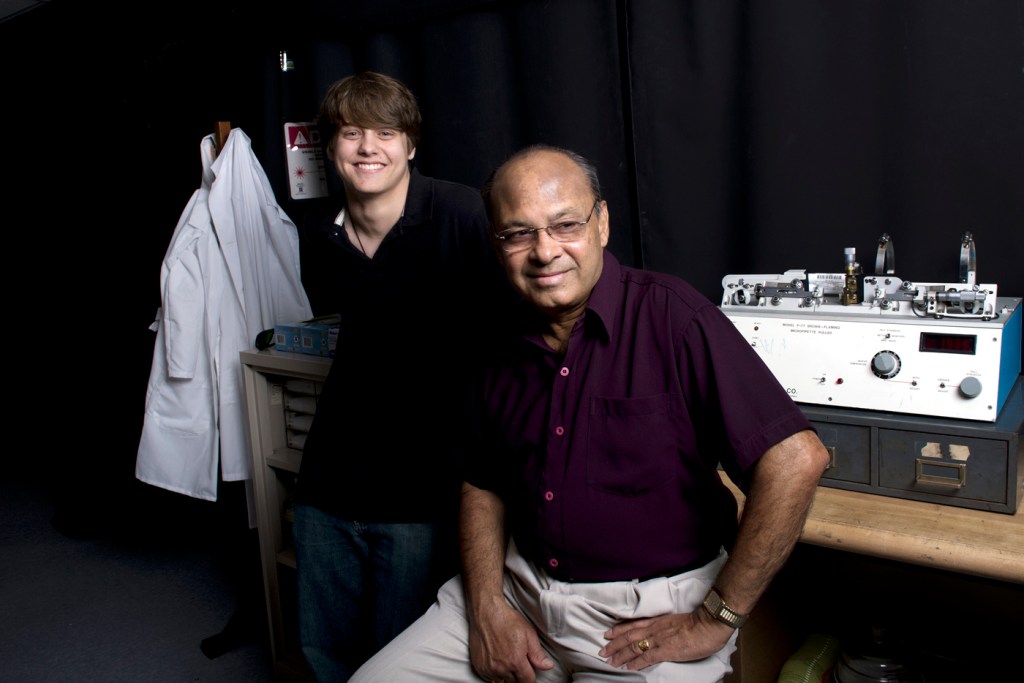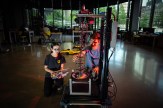New grant supports co-ops in cancer nanomedicine

Northeastern University has received a five-year, $1.15 million grant from the National Institutes of Health’s National Cancer Institute to train the next generation of cancer nanomedicine scientists and clinicians through a unique experiential learning program.
The grant aligns with Northeastern’s focus on discovering solutions to global challenges in health, one of the university’s three programmatic pillars.
“Nanotechnology is leading to breakthroughs in diagnosis and therapy of many diseases, particularly cancer, leading to the new discipline of cancer nanomedicine,” said principal investigator Srinivas Sridhar, Northeastern’s Arts and Science Distinguished Professor of Physics, Bioengineering, and Chemical Engineering, and the director of the university’s IGERT Nanomedicine Science and Technology program. “Advances in the field are beginning to have revolutionary impact on healthcare.”
The centerpiece of the new program, which is called “CaNCURE: Cancer Nanomedicine Co-ops for Undergraduate Research Experiences,” is a unique partnership between Northeastern and the Initiative to Eliminate Cancer Disparities at the Dana-Farber/Harvard Cancer Center. DF/HCC is the nation’s largest comprehensive cancer center, bringing together the research efforts of its seven member institutions, comprising Beth Israel Deaconess Medical Center, Boston Children’s Hospital, Brigham and Women’s Hospital, Dana-Farber Cancer Institute, Harvard Medical School, the Harvard School of Public Health, and Massachusetts General Hospital. For more than a decade, the IECD—among the nation’s first integrated, inter-institutional programs focused on eliminating cancer disparities—has offered programming to address the complexities of cancer disparities, including training students, enhancing research, and facilitating access to underserved populations.
Over the next five years, a total of 75 undergraduate students will receive training to study and conduct cancer nanomedicine research in the laboratories of 35 leading scientists at Northeastern and DF/HCC. These six-month co-op experiences, facilitated through Northeastern’s co-op office, will provide students in majors ranging from biomedical physics to chemical engineering with hands-on research experience and one-on-one mentoring from the leading researchers in cancer nanomedicine at these partner institutions.
“These mentors represent some of the world’s best scientists in cancer nanomedicine research,” Sridhar explained, noting that the undergraduate researchers will also have the opportunity to collaborate with their postdocs and graduate students. “We are tapping into an unprecedented resource of talent and expertise for teaching and the students’ learning environment is going to be absolutely outstanding.”
Sridhar, who expects to enroll the program’s initial cohort of students this fall, has placed an emphasis on attracting young scientists from underrepresented minority groups. “Our goals are well aligned with that of NCI, which wants to ensure that segments of the population that are underrepresented in the scientific and healthcare professions have access to opportunities in research and professional development,” he said.
All enrollees will participate in specialized workshops, conferences, and bi-monthly seminars featuring cancer nanomedicine experts. At the conclusion of the yearlong program, each student will give a presentation of his or her work. Applications for the program are being accepted now. Interested students should contact their co-op advisors and check the co-op job posting site.
“We really want to motivate students to pursue careers in cancer research and clinical practice,” Sridhar said.





